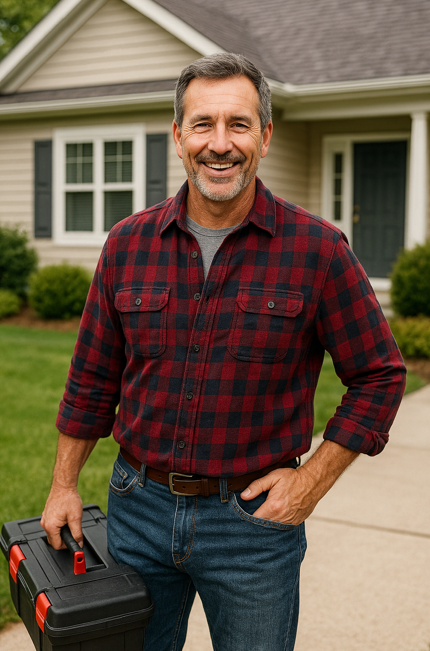What You Need to Know About Heating Mobile and Manufactured Homes
Hey folks—Mike here. If you're living in a mobile or manufactured home and trying to figure out if electric heat is a safe bet, I’ve got some solid news for you: Yes, it can be safe. But (you knew there was a "but"), it depends on doing it right.
I've owned both a traditional home and a double-wide. And I’ve been through everything from space heaters to full-blown HVAC systems. So today, we’re going to break down why electric furnaces—like this 20 kW Goodman unit—can be a smart, safe option for mobile and manufactured homes.
Are Electric Furnaces Actually Safe for Manufactured Homes?
Short answer: Yes—when installed properly. The U.S. Department of Housing and Urban Development (HUD) has set clear safety standards for HVAC equipment in manufactured homes, outlined in their Manufactured Home Construction and Safety Standards.
Electric furnaces don’t rely on combustion like gas systems do, so there's no risk of carbon monoxide, and no need to worry about gas line hookups or venting flue gases. That makes them particularly suited for homes without existing gas infrastructure—like many mobile and manufactured setups.
What Makes a Furnace Mobile-Home Approved?
Here’s what to look for:
-
UL-Listed and Mobile-Home Rated: The unit must be certified for use in mobile or manufactured homes.
-
Proper Electrical Compatibility: Many older mobile homes aren’t wired for high-demand appliances, so make sure your panel can handle a 20 kW draw.
-
Approved Ducting: Mobile homes often use smaller or more compact duct systems, so you need a furnace that can push out heat with enough static pressure—like the Goodman MBVK20DP1X00, which delivers 2,000 CFM.
And if your home is set up for a downflow or multi-position install? Even better. The Goodman unit is flexible enough to meet that need.
Safety Features Built Into Electric Furnaces
Modern electric furnaces come with built-in protections:
-
Overheat protection: Shuts the system down if temps get too high.
-
Sequencers: Help stagger power usage to avoid circuit overload.
-
Limit switches: Prevent overheating if airflow is restricted.
Pair these with a smart thermostat, and you've got a safe, responsive system.
What About Energy Efficiency?
Now, I’ll be straight with you—electric heat isn’t always the cheapest. But it can be efficient when installed properly. Unlike old electric baseboards, modern electric furnaces use multi-stage heating to match your home’s demand.
And in newer manufactured homes with better insulation and sealed underbellies? You’d be surprised how little power you actually use. Need to fix yours? Check out this solid mobile home belly insulation guide.
Installation Tips for Electric Furnaces in Manufactured Homes
Want it done right? Here’s what I’d suggest:
-
Hire a licensed HVAC pro—especially one with experience in mobile homes.
-
Run a load calculation to confirm that 20 kW is enough (for most homes up to 2,000 sq ft, it usually is).
-
Upgrade your electrical panel if needed. A 20 kW furnace needs a 100-amp breaker, minimum.
-
Seal and insulate ducts—especially under the home where temps drop fast.
-
Install a programmable thermostat to avoid wasting power.
And while it’s tempting to DIY, HVAC mistakes in a mobile home can cause big issues—overheating, short cycling, or even fire risks if not wired properly.
When You Might Want Something Else
To be fair, there are some cases where an electric furnace may not be your best option:
-
Off-grid or high electric rates: Consider a propane or mini-split alternative.
-
Poor insulation or drafty skirting: You’ll burn more power than needed.
-
Severe climates (like Minnesota winters): You might need supplemental heat.
That said, most folks with a modular or HUD-coded manufactured home will find electric furnaces to be a clean, safe, and affordable option—especially when buying from a trusted supplier like The Furnace Outlet.
Final Word from Mike
Look, I’m not an HVAC engineer—I’m a homeowner who’s made the mistakes, asked the dumb questions, and found my way to a setup that works. And here’s my honest take:
If your home is properly insulated, your panel is up to code, and you’ve got decent airflow, a 20 kW electric furnace like the Goodman MBVK20DP1X00 is a great choice. It’s:
-
Safe (no combustion)
-
Simple (no fuel delivery)
-
Cost-effective (especially for mobile or modular homes)
You’ll stay warm without the headaches of gas lines, venting, or leaky propane tanks. And with electric, there’s no worrying about carbon monoxide.
So yeah—electric heat is safe for mobile and manufactured homes. Just be sure it’s installed smart and sized right.
Got more questions about your setup? Shoot me a message. I’ve probably already made that mistake—and lived to tell the tale.







